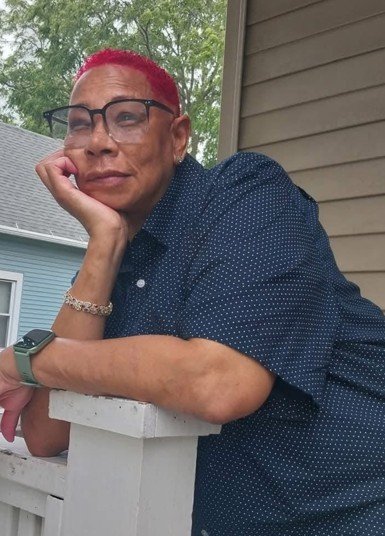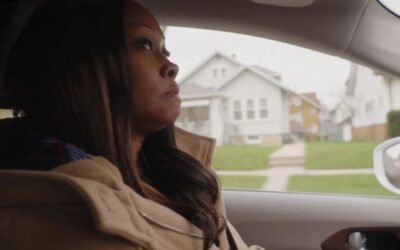
Caroline Gatson
MILWAUKEE, WI – For Caroline Gatson, a more than 30-year battle with addiction came to an unexpected turning point on what began as an auspicious night, and turned into even more. Armed with a $50 stake, she walked into Potawatomi Casino and left with $1,700 in winnings. That evening, Caroline used several drugs and alcohol at a friend’s apartment. But by morning, something shifted dramatically.
With $1,300 still in her pocket, Gatson found herself standing outside a liquor store, ready to continue the cycle. Instead, she looked up at the sky and felt a wave of clarity wash over her. “I just said, ‘You know what, Lord? I’m tired. I’m just tired,’” she recalls. Turning away, she walked several blocks, eventually finding herself outside First Step, a detox center.
She threw her cigarettes, lighter, and drug paraphernalia into a dumpster and walked inside. That decision marked the beginning of a transformative journey—one that would take her from the depths of addiction to representing hope for others struggling with substance use disorders.
A Life Reclaimed
Gatson’s path to recovery was not her first attempt. Over the years, she had tried to break free from addiction, but trauma and loss repeatedly pulled her back into use. This time, however, was different. Despite enduring unimaginable pain, including the death of a son, Gatson has remained sober. Now 59, she is pursuing a degree in psychology at Alverno College and has become a pillar of her community.
Furthermore, her story is a testament to the power of supportive programs and services and the indispensable role of harm reduction services, such as providing naloxone and fentanyl test strips, particularly in Milwaukee’s Black neighborhoods. In these communities, overdose deaths are disproportionately higher than in white communities, even though drug use is the same among the groups. Gatson’s journey demonstrates that transformation is possible, even in the face of overwhelming odds, when harm reduction’s comprehensive and compassionate approaches are adopted and effectively implemented.
Fighting for a Second Chance
After nearly a week at First Step, Gatson was told she would be discharged on the sixth day. With $1,300 still in her pocket, she knew the stakes were high. “If I’d gone back to the streets, I probably wouldn’t be here talking to you today,” she says. Determined to avoid relapse, she began advocating for herself, making phone calls to treatment centers across Milwaukee.
Her persistence paid off when she secured a bed at Second Century, a treatment center where she spent 90 days. In January 2023, she transitioned to Samad’s House, a sober living space for women in recovery. Gatson quickly became indispensable, and founder Tahira Malik hired her as a live-in house leader and a harm reduction ambassador supporting people who use drugs in the community. She stayed until September 2024, when she left to pursue her college degree, but she continues to support Samad’s House as a volunteer.
A Past That Shaped Her
Gatson’s struggles with addiction began in her teenage years. In high school, she started smoking marijuana with friends. By her senior year, she was dating a man who showered her with gifts and money—only to reveal himself as a drug dealer later. When she became pregnant, her father forced her into marriage.
“He fascinated me with his money, and at such a young age, I didn’t know any better,” she reflects. But the marriage quickly turned abusive, and Gatson turned to her husband’s stash of crack cocaine to cope. What followed were years of addiction, jail time, and homelessness, with her family often going months without hearing from her.
“My biggest regret is the pain I caused my loved ones,” she says.
Ten years ago, Gatson thought she was on the right path. She was working as an executive chef when she took a bad fall in the freezing cold after work one evening. It was 28 below zero when she slipped on black ice between her garage and home. She was unable to move. And in the 37 minutes before a neighbor found her, she got frostbite in her fingers and suffered back injuries. Her fingers were so damaged that at the hospital emergency room, wound care specialists and surgeons waited to see if they would fall off and need to be reattached. Gatson recovered physically from the ordeal, but the mental anguish of being forced to retire because of the injuries overwhelmed her.
“I ended up battling with homelessness, suicidal thoughts, isolation, and withdrawal from my family,” Gatson says. “And along the way, I had to deal with a lot of death in my family, and next thing I knew, I was back in full-blown addiction. It took me seven years longer to fully embrace what needed to be done and have the courage to do it.
“I learned that most people say, well, when I get my nails done or my hair done, then I’m going to check into treatment or I am going on this day because I’m waiting on something to happen. However, I’ve learned that recovery does not come with a specific appointment date or time. It’s just something that happens. It has to happen like at the spur of the moment when you decide that you are tired of this life and must have a change.”
Empowering Others
At Samad’s House, Gatson found her calling. She became a mentor and advocate, connecting with residents on a profoundly personal level. “She knew so many people in the community,” says Malik. “Because people trusted her, they came to us for harm reduction resources and advice. She met people where they were, whether they were in active addiction or pursuing abstinence-based recovery.”
Malik recalls a recent Saturday when Gatson volunteered to help with a focus group for Samad’s House alumni. “Caroline is always my right hand,” Malik says. “She’s not just on time—she’s early. Seeing what she’s accomplished fills my heart. Even after losing her youngest son, she stayed strong. That loss gave her even more resolve to keep going.”
Gatson makes a lasting impression. Trina Wilson, 58, was a resident at Samad’s House during her recovery. She says Gatson was instrumental in helping her succeed.
“She is a wonderful, caring, loving, beautiful person,” lauds Wilson. “She gives excellent advice, even sometimes when you don’t really want to hear it. I’ve been gone from Samad’s house for about a year, but Caroline still calls me and checks up on me. She is a true friend.”
Full Circle
Gatson never imagined herself working with people struggling with addiction, but her journey has come full circle. “I always wanted to give back to the community,” she says. “Working at Samad’s House was my start. Along the way, I became a woman of empowerment, mentoring women. That’s what brings my journey full circle.”
Today, Gatson is a symbol of resilience and hope. Her story highlights the importance of investing in supportive harm reduction services and treatment programs, demonstrating that every life is valuable.



